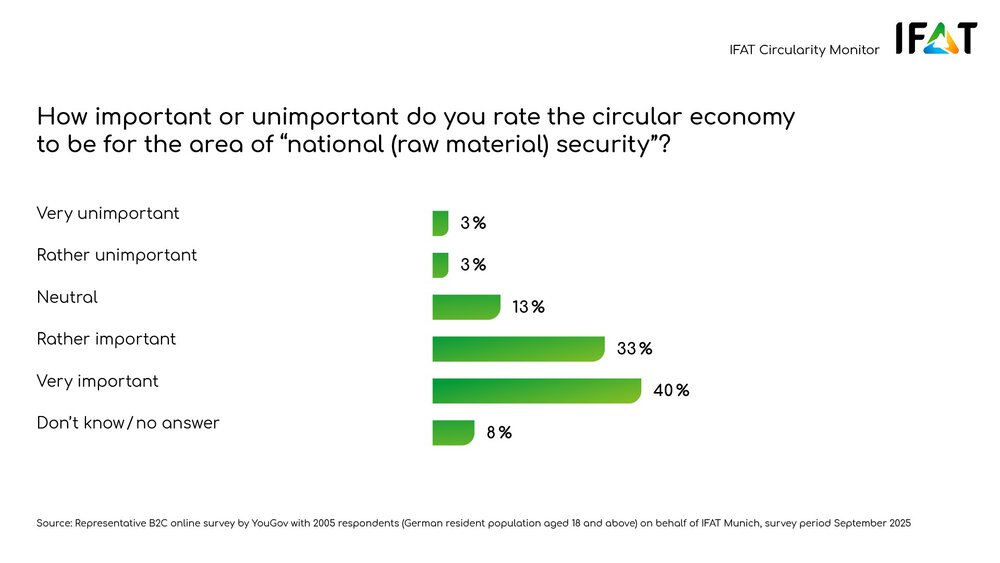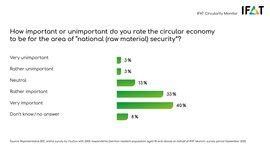Securing strategic raw materials through circularity: IFAT Munich makes green defense tangible
November 18, 2025
- Important for national (raw material) security: Almost two thirds of Germans attach great importance to the circular economy
- Wolfgang Ischinger: “The circular economy becomes a factor for geopolitical stability.”
- Anja Siegesmund: “Clear resource targets, binding recycling quotas, and sustainable public procurement.”
For Germans, Germany’s raw material security starts at the recycling center, as the IFAT Circularity Monitor, a representative YouGov survey* commissioned by IFAT Munich, shows. 73%** of Germans rate the circular economy as important with regard to national (raw material) security, and more than half** see it as a pacesetter for new economic growth. At the same time, 83%** state that they still feel poorly or only sufficiently informed about this subject.
“People understand that circularity is more than just environmental protection – it is part of our green defense. In a world where over 90% of our raw materials are imported, resource sovereignty is becoming a new security issue for Germany,” says Phillip Eisenmann, Exhibition Director IFAT Munich. “Our goal as a worldleading trade fair is to make this connection visible – to politics, business and society: Environmental technology is the backbone of economic resilience and geopolitical stability."
Independence from raw materials as a power factor
IFAT Munich is adding a decisive dimension to the concept of green defense, previously used primarily in the context of military sustainability strategies and environmentally friendly defense technologies: as a concept for society as a whole that combines ecological stability, resource sovereignty and economic resilience.
“Although, intuitively, the idea of green defense is already well understood, it now also needs to be fleshed out in political and economic terms,” says Ambassador (ret.) Wolfgang Ischinger, Chair of the Munich Security Conference. “Raw materials are instruments of power. Dependence means vulnerability. If we recover rare earths from old devices instead of importing them at high cost, we strengthen our technological sovereignty. If we keep steel, aluminum or copper in circulation, we make ourselves resilient to market distortions. Green defense means that the circular economy becomes a factor for geopolitical stability.”
57% of Germans see circularity as a key to reducing dependence on imports – a clear signal of social support for the circular economy. Anja Siegesmund, Executive President of the Federal Association of the German Waste, Water and Recycling Industry (BDE), is campaigning for a more effective circular economy: “Our member companies are ready. Strategies and concepts alone do not offer our companies any investment security. What matters now are clear resource targets, binding recycling quotas, and public procurement that favors circular materials. We are part of the solution for greater competitiveness and raw material security.”
88%** of company decision-makers expect positive effects
Only 10%** of Germans fear that the circular economy could have a negative impact on companies in Germany. YouGov also surveyed a representative sample of decision-makers for the IFAT Circularity Monitor. The B2B survey also reaches a clear conclusion: 88%** expect a consistently implemented circular economy to be able to contribute to an economic upturn in Germany. “These figures provide a boost,” says Siegesmund. “They show that people are ready for a policy that combines sustainability with security. Green defense is not an abstract strategy – it is a mission.”
At IFAT Munich (May 4 to 7, 2026), the focus will be on the ecological, economic and security policy dimension of circularity. As the world’s leading trade fair for environmental technologies, IFAT Munich sees itself as a central platform for new technologies, knowledge transfer, and social and political discourse.
You will find more information about IFAT Munich at https://ifat.de
* The data in this survey is based on online interviews with members of the YouGov panel who agreed to participate in advance. A total of 2,005 people were surveyed for the B2C survey between September 12 and 14, 2025. The survey was quota-based by age, gender and region, and the results were then weighted accordingly. The results are representative of the resident population in Germany aged 18 and over. A total of 506 company decisionmakers were surveyed for the B2B survey between September 15 and 25, 2025. The survey was quota-based and the results weighted. The respondents are representative according to the proportion of employees per company size, gender and age groups of company decisionmakers, six NACE economic sectors and Nielsen regional distribution of companies.
** The percentages reported are based on the aggregation of two (or more) adjacent scale points, e.g., “rather important” and “very important”.
Downloads
201220

- PR Manager








